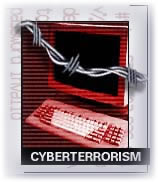![]()
Internet
security is the protection of resources and information on the
Internet. Internet security covers a wide range of topics. Issues
like hacking, file sharing, Internet fraud, on-line identity theft,
Internet child pornography, theft of trade secrets, and viruses
are all related to Internet security. Internet security plays
a large role in the transfer of information from one person to
another. Information transfer can include a long list of tasks
that are performed on a daily basis, from simple e-mails to a
friend, to specialized business reports to a manager, to highly
classified government data between countries. With the growing
popularity of the Internet as well as the frequency that people
encounter information transfer on a daily basis, internet security
is a very important issue in today’s world. |
 |
| Internet
security also deals with national security issues. The ability to
transfer all types of information through the internet is a big
concern for government security agencies. In 1996, the Communications
Decency Act was passed, which was an attempt by the government
to ban obscene and indecent material from the Internet. Although
it did not focus mainly on national security, it was the first type
of legislation that tried to control the Internet for the sake of
protection, in this case the protection of kids from pornographic
and gruesome material. The Communications Decency Act was ruled down by the United States Supreme Court in the 1997 court case Reno vs. the American Civil Liberties Union. The court ruled that the act violated the 1st Amendment as well as the 5th Amendment. But some state legislators did not give up their attempt to enforce some type of control over the Internet. Georgia and New York both passed laws in their state governments that somehow policed the Internet by levying hefty fines and even prison time against people guilty of the transmission of indecent material across the Internet. The Georgia law also made it illegal to use pseudonyms or communicate anonymously over the Internet. These laws have been protested by the ALCU, and legal action has ensued. Yet the fact remained that governments, both state and federal, had actively tried to regulate the Internet in the name of safety and protection. |
 |
After the events of September 11, 2001, President Bush passed the Patriot Act, which essentially gave national security agencies like the FBI, the CIA, and the NSA more power and authority to scan and filter e-mail messages, chat room dialogues, and web navigation for terrorist activity. One of the main proponents of this act, Senator Patrick Leahy of Vermont, reasoned that the act was essential to national security because “To prevent future terrorist attacks, we must improve our intelligence-gathering capabilities, and make sure that intelligence about potential terrorists is shared with necessary actors throughout the government.” |
| Our society and national economy has become fully dependent on information technology and transfer, and the Internet was the main tool used in this movement. Each sector of our economy, from energy to transportation, is supported by network upon network of computers linked together. In essence, our national security relies on the productivity and protection of these networks, and through the Internet, some people with malicious intent can infiltrate these networks and threaten our safety. |
| The big issue at hand is whether or not the Patriot Act infringes upon a person’s constitutional rights, most notably the 1st Amendment’s guarantee of the freedom of speech. Many organizations such as the ACLU believe that it is not necessary to violate privacy as it is possible to be both safe and free. Other civil libertarians feel that the Patriot Act just erodes fundamental freedoms and treads upon personal liberties. The dilemma in this case is whether a fair compromise exists between individual rights and national security. |  |
